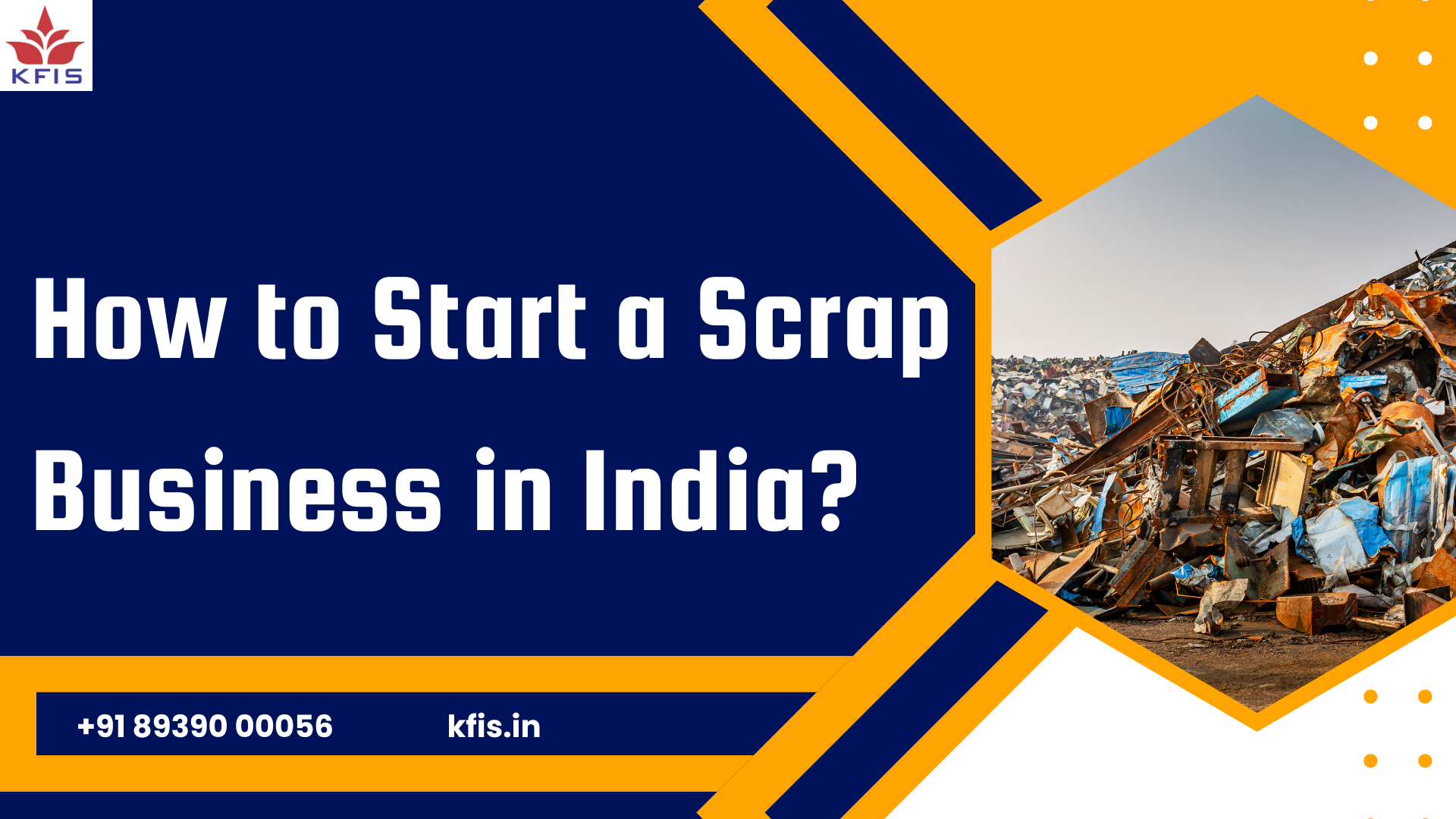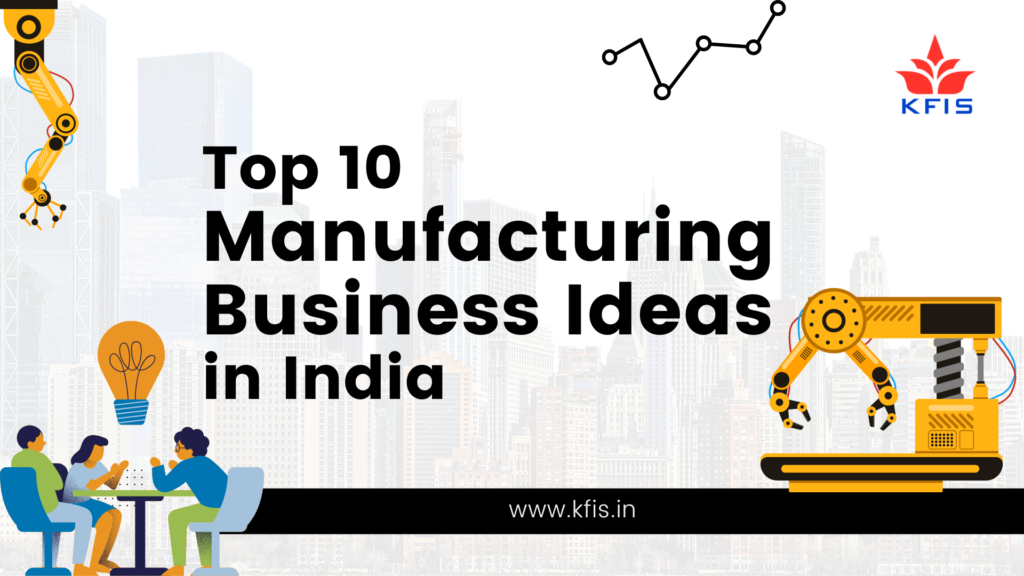
Starting a scrap business in India is an increasingly lucrative venture, fueled by the growing emphasis on recycling and sustainability.
With the right knowledge and planning, you can establish a successful business that not only generates profit but also contributes positively to the environment.
This comprehensive guide will cover how to start a scrap business in India, the types of scrap you can work with, a list of scrap business ideas, and detailed insights on how to get business loans from Kfis.
Understanding the Scrap Business
The scrap business involves collecting, processing, and selling recyclable materials such as metals, plastics, paper, and electronic waste. As an entrepreneur in this field, you will be contributing to environmental sustainability while generating revenue.
The process typically includes sourcing scrap materials, sorting them based on type and quality, processing them for resale, and establishing connections with buyers.
Types of Scrap
Understanding the various types of scrap is essential for your business. Here are the primary categories:
1. Metal Scrap
Metal scrap is one of the most valuable categories in the recycling industry. It can be divided into two main types: ferrous and non-ferrous metals.
- Ferrous Metals: These are metals that contain iron. They are magnetic and prone to rust when exposed to moisture. Common examples include:
- Iron Scrap: Used extensively in construction and manufacturing.
- Steel Scrap: Widely recycled due to its strength and durability.
- Non-Ferrous Metals: These metals do not contain iron and are generally more valuable due to their resistance to corrosion. Common examples include:
- Aluminum: Lightweight and used in packaging and construction.
- Copper: Highly sought after for electrical applications.
- Brass: An alloy of copper and zinc, used in plumbing fixtures.
- Lead: Commonly found in batteries; must be handled carefully due to toxicity
2. Plastic Scrap
Plastic waste is abundant and can be recycled into various products. The recycling process involves collecting used plastic items, sorting them, and processing them into reusable materials. Common types of plastic scrap include:
- PET (Polyethylene Terephthalate): Found in drink bottles.
- HDPE (High-Density Polyethylene): Used for containers and bottles.
- PVC (Polyvinyl Chloride): Commonly used in pipes.
3. Paper Scrap
Collecting paper from offices and schools can be profitable. Recycled paper is used to create new products like notebooks and packaging materials. Types of paper scrap include:
- Cardboard: Often collected from retail businesses.
- Newsprint: Collected from newspapers for recycling.
4. Electronic Waste (E-Waste)
E-waste includes discarded electronics such as smartphones, laptops, and appliances. With rapid technological advancements, e-waste recycling has become increasingly important due to the hazardous materials contained within these devices.
5. Automobile Scrap
The Indian government’s initiatives to modernize the vehicle fleet have created opportunities in the automobile scrap sector. Old vehicles can be dismantled for parts or recycled entirely.
Steps to Start Your Scrap Business
1. Conduct Market Research
Market research is essential for understanding the demand for various types of scrap materials in your area. Focus on:
- Identifying which types of scrap are in high demand.
- Analyzing local competitors and their pricing strategies.
- Finding reliable suppliers and potential customers.
2. Create a Business Plan
A well-structured business plan will guide your operations. It should include:
- Overview of your business model.
- Marketing strategies.
- Financial projections.
- Operational plans detailing how you will collect, process, and sell scrap.
3. Obtain Necessary Licenses and Permits
To operate legally in India, you will need several licenses:
- Business License: Obtain from your local municipal corporation.
- GST Registration: Required if your turnover exceeds Rs. 40 lakhs.
- Trade License: Certifies compliance with health and safety regulations.
- Pollution Control Board Certificate: Ensures adherence to environmental regulations
4. Secure Funding
Funding is crucial for starting your scrap business. Kfis offers various financing options that can help you get started:
- Small Business Loans: Ideal for initial capital.
- Term Loans: For specific equipment purchases or expansions.
- MSME Loans: Tailored for micro, small, and medium enterprises.
To apply for a loan:
- Prepare a detailed business plan outlining your operations.
- Gather necessary documents like identity proof and financial statements.
- Submit your application through Kfis’s online platform.
5. Acquire Equipment
Investing in the right equipment is vital for efficient operations:
- Containers for storage.
- Weighing scales for accurate measurements.
- Processing machines specific to the type of scrap you are handling
6. Build a Network
Establish relationships with suppliers and buyers to ensure a steady flow of materials and sales:
- Attend industry events to connect with other professionals.
- Utilize online platforms dedicated to buying and selling scrap.
List of Scrap Business Ideas
Here are some viable scrap business ideas that you can consider:
- Metal Recycling Business
- Collect metal scraps from industrial sites or households and process them for resale.
- E-Waste Recycling
- Focus on collecting electronic waste from consumers or businesses and recycle it responsibly.
- Plastic Recycling
- Create a business around collecting plastic waste and transforming it into reusable products.
- Paper Recycling
- Set up a collection service for used paper products from offices and schools to recycle them into new paper goods.
- Automobile Dismantling
- Start an automobile scrap yard where old vehicles are dismantled for parts or recycled entirely.
- Glass Recycling
- Collect glass bottles from restaurants or bars and sell them to glass recycling plants.
How To Get Business Loans
Securing funding is essential for your success in the scrap industry. Kfis provides various financing options tailored specifically for entrepreneurs:
- Unsecured Business Loans: Up to Rs 5 Cr with competitive interest rates.
- Flexible repayment options that suit your cash flow needs.
To apply:
- Prepare your business plan detailing how you intend to use the funds.
- Gather necessary documentation including proof of identity, address proof, and financial records.
- Apply online through Kfis’s user-friendly platform for quick processing.
Environmental Impact of Recycling Scrap Metal
Recycling metal has profound environmental benefits:
- Conserves Natural Resources: By recycling existing metals instead of mining new ores reduces depletion rates significantly while protecting ecosystems affected by mining activities!
- Reduces Energy Consumption: Producing new metals requires substantial energy inputs—recycling uses significantly less energy (upwards of 95% less energy required compared with primary production).
- Decreases Landfill Waste: The more we recycle our waste products (including metals), the less we contribute towards overflowing landfills which pose serious environmental hazards!
- Promotes Sustainable Practices: Engaging communities around recycling initiatives fosters awareness about sustainability leading towards healthier lifestyles overall!
Starting Your Own Scrap Collection Service
If you’re considering starting a collection service as part of your overall strategy here’s how:
- Identify target neighborhoods where residents may have excess recyclable material they’d be willing dispose off easily without hassle!
- Create flyers advertising services offered including free pickups!
- Utilize social media platforms effectively spread word around local community groups encouraging participation within neighborhoods!
- Partner with local businesses who may benefit from having their waste collected regularly—this could lead towards mutually beneficial arrangements down line!
- Consider investing into vehicles suitable transporting larger quantities collected effectively!
Conclusion on Starting A Scrap Business
Starting up any venture requires careful planning but entering into field focused around sustainability offers unique advantages! With proper guidance provided through this article regarding steps needed take along with support available via companies like Kfis—there’s never been better time jump into exciting world recycling!By understanding different types available along with potential profits achievable—your journey towards establishing successful operation awaits!Embrace opportunity today—make difference tomorrow!
In-depth Analysis of Scrap Types
Ferrous Metals
Ferrous metals are primarily composed of iron or steel and are known for their strength but are prone to rusting when exposed to moisture over time:
- Iron Scrap
- Iron is one of the most recycled materials globally due to its widespread use in construction (e.g., beams, columns) as well as manufacturing (e.g., machinery).
- Steel Scrap
- Steel is an alloy made primarily from iron mixed with carbon; it’s commonly found in household appliances like refrigerators or ovens that can be recycled efficiently due to its high demand in industries ranging from automotive manufacturing to construction projects.
Non-Ferrous Metals
Non-ferrous metals do not contain iron; they are generally lighter than ferrous metals which makes them ideal for applications where weight savings are critical:
- Aluminum
- Widely used due to its lightweight nature; aluminum cans are among the most commonly recycled items globally because they can be recycled indefinitely without loss of quality.
- Copper
- Highly sought after due to its electrical conductivity; copper wire is often stripped from old electronics before being sold as scrap metal at high prices.
- Brass
- An alloy primarily made up of copper and zinc; brass fittings found in plumbing systems make this metal valuable when recycled properly due to its durability against corrosion.
- Lead & Nickel
- Both metals have specialized applications; lead is often found in batteries while nickel is commonly used in electronics production—recycling both prevents environmental pollution while conserving valuable resources!
- Titanium
- Strong yet lightweight making it ideal across aerospace industries; titanium recycling process may be challenging but very beneficial since it can be infinitely recycled without losing any features!
Environmental Benefits of Recycling Scrap Metal
Recycling metal has profound environmental benefits:
- Conserves Natural Resources
- Reduces Energy Consumption
- Decreases Landfill Waste
- Promotes Sustainable Practices
Starting Your Own Scrap Collection Service
If you’re considering starting a collection service as part of your overall strategy here’s how:
- Identify target neighborhoods where residents may have excess recyclable material they’d be willing dispose off easily without hassle!
- Create flyers advertising services offered including free pickups!
- Utilize social media platforms effectively spread word around local community groups encouraging participation within neighborhoods!
- Partner with local businesses who may benefit from having their waste collected regularly—this could lead towards mutually beneficial arrangements down line!
- Consider investing into vehicles suitable transporting larger quantities collected effectively!



